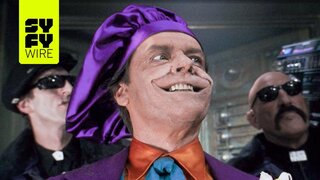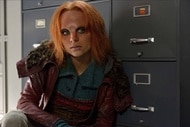Create a free profile to get unlimited access to exclusive videos, sweepstakes, and more!
How Tim Burton Got the Idea for Edward Scissorhands
Burton supplied his own inspiration for one of the 1990s’ most innovative fantasy films.
Even at the gothic heights of box office blockbusters like Batman (1989), Tim Burton’s characters are at their most Burton-esque when they’re oddballs, outsiders, and, especially, loners. Isn’t that essentially what a rich and eccentric guy like Bruce Wayne is, after all? Outside the highly-controlled confines of Wayne Manor, he’s stepping into a Gotham that might eventually turn out to appreciate him — but it’ll never really understand him.
If Batman’s isolation is one of mostly circumstance, the sweetly awkward loneliness at the heart of Edward Scissorhands (streaming here on Peacock) is something a bit more pure. Bound by themes of Pinocchio (he’s not even a real boy!) and Frankenstein (an inventor pieced him together from spare parts!), the orphaned creation who lives in a mansion at the top of a hill has an outsider’s loneliness baked into his clockwork DNA.
What Edward Scissorhands and Tim Burton have in common
It’s only natural: When you’re a synthetic human with scissors for hands, no one can ever truly grasp what it must be like to be you. And while Burton’s prolific directing career would go on to prove that he’s not exactly a brooding Hollywood outsider himself, 1990's Edward Scissorhands — the first film in Burton’s enduringly fruitful collaboration with Johnny Depp — remains widely regarded as one of Burton’s most personal and emotionally autobiographical films.
There’s at least a twofold reason for that. On one hand, movies about misfits (or simply the misunderstood, like Albert Finney's father figure in Big Fish) are just a part of Burton’s general creative signature. On the other, the seeds of Edward Scissorhands as a character have their specific beginning in Burton’s own childhood, a youth he once characterized to The Hollywood Reporter as “different and isolated.”
“You feel kind of different and isolated and you don’t feel like you fit into your surroundings. It was strange. Just because you like monster movies, people though you were weird, which I always felt was an odd thing,” Burton explained of his younger days, in a 2013 interview with THR, likening his signature lonely movie characters to Frankenstein — the ultimate movie misfit: “He’s perceived as a monster, even though he isn’t really. He’s just different.”
Looking lethal with his sharp-edged slicers but totally benign as the movie’s new man about town, that’s exactly what Depp’s misfit character in Edward Scissorhands is. Unless it’s to protect not even himself, but a friend in peril, he’d hardly hurt a fly with those dangerous digits — but as the movie’s ending illustrates, he remains forever walled away from the rest of society, separated by an impenetrable barrier between the freakish and the mundane.
Burton’s childhood didn’t just signal to the future directing great that he sensed something oddly out of place about himself among peers; it actually yielded the original character idea on which Edward Scissorhands the movie would someday be based.
“One night over drinks, Tim told me about this drawing he’d made in high school of a character who had scissors for hands, and I instantly knew what to do with that image,” Caroline Thompson, the movie’s screenwriter, shared with Variety in a 2015 interview. “So I wrote a 70-page treatment in about three weeks and gave it to him. And that’s basically the movie we ended up with.”
Featuring Vincent Price in one of his final film roles and starring Depp alongside 1980s icons including Winona Ryder and Anthony Michael Hall, Edward Scissorhands’ surreal fantasy setting is bolstered by an angelic score from frequent Burton composing mainstay Danny Elfman. Stream it on Peacock here!






























